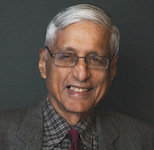Rajmohan Gandhi in Oxford Union Debate
Rajmohan Gandhi, a former President of Initiatives of Change International, was a speaker this month in a debate at the Oxford Union on ‘This house regrets the Partition of India’. Other speakers included former Indian Minister of External Affairs Salman Khurshid; Ashis Ray, India’s longest-serving foreign correspondent; and historian Professor Mridula Mukherjee. Nearly 300 students came to hear the debate, many of them with Pakistani or Indian heritage.
‘In supporting the motion, I express sorrow at Partition’s pain, and dismay at Partition’s brutal cost,’ said Professor Gandhi. ‘It may be argued that majorities tyrannize. But the 1947 Partition did not reduce the majority’s power to oppress. Muslim majorities who got Pakistan did not need it; Muslim minorities remaining in India who needed security became more insecure.
‘In both halves that resulted, majorities became preponderant majorities. In some places they became cruel majorities. What would you say of a separation that places vulnerable children under the permanent rule of a cruel man who is not their father, or of a cruel woman who is not their mother? This in effect is what Partition did in both divided halves.
‘I deeply regret the fact that the people and the leaders of India prior to 1947, and the people and leaders of the UK, could not retain unity while ushering in liberty. But I do not regret independence, whether of Pakistan or India.
‘Who celebrates Partition?’ he asked. ‘Champions of a purely Hindu India, champions of a purely Muslim Pakistan, those with a seemingly unquenchable thirst to suppress minorities – such interests have rejoiced over Partition. Tyranny was multiplied by Partition.’
Several speakers highlighted Britain’s responsibility. Professor Gandhi quoted Vallabhbhai Patel of Gujarat, who said in 1945, ‘The British talk of Hindu-Muslim quarrels but who has thrust this burden on their shoulders?.... Give me just a week’s rule over Britain, I will create such disagreements that England, Wales and Scotland will fight one another for ever.’
‘We do not seek to undo Partition,’ Professor Gandhi went on. ‘We see the greatness that might have been, but it is the future that holds our attention, and for that future we are resolved to know and befriend our neighbours, if possible to reach an agreement of partnership for the future. We know that the finest defence for a nation is the friendship of its neighbour.
‘Despite many weaknesses, India may have a message for the world – the message of friendship, of forgiveness, of reconciliation, of understanding. The message was and is spelt out by the Buddha, Ashoka, and Akbar. By some sons and daughters of Great Britain, who contributed to Indian unity. By Gandhi, Nehru, Patel, Maulana Azad and Khan Abdul Ghaffar Khan.
‘Once upon a time, our tribe was our world. Today the planet is our village. I am sure this house will want Hindus, Muslims, Christians, Sikhs and Buddhists to walk side by side for peace. May Oxford continue to cultivate, as it has for centuries, the seeds of dialogue and reconciliation.’
When it came to the vote, the motion won by a substantial majority.
John Bond
